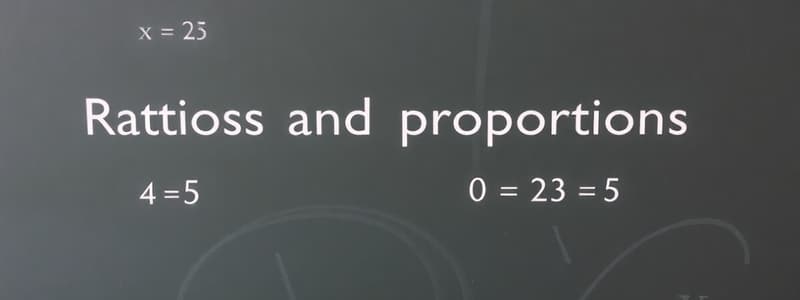Podcast
Questions and Answers
A machine can print 280 pages in 4 hours. What is the unit rate of pages printed per hour?
A machine can print 280 pages in 4 hours. What is the unit rate of pages printed per hour?
- 80 pages per hour
- 60 pages per hour
- 70 pages per hour (correct)
- 1120 pages per hour
A relationship is described by $y = kx$. If $y = 45$ when $x = 3$, $y=75$ when $x=5$ and $y=120$ when $x=8$, what is the constant of proportionality (k)?
A relationship is described by $y = kx$. If $y = 45$ when $x = 3$, $y=75$ when $x=5$ and $y=120$ when $x=8$, what is the constant of proportionality (k)?
- 20
- 10
- 15 (correct)
- 5
A recipe requires 2 and 1/2 cups of flour for 3 batches. What is the unit rate of flour needed per batch?
A recipe requires 2 and 1/2 cups of flour for 3 batches. What is the unit rate of flour needed per batch?
- $2/3$ cups per batch
- $3/5$ cups per batch
- $5/6$ cups per batch (correct)
- $6/5$ cups per batch
If a person walks 1/2 a mile in 20 minutes, how many minutes does it take to walk 1 mile?
If a person walks 1/2 a mile in 20 minutes, how many minutes does it take to walk 1 mile?
Michaela earns $120 in 10 hours and Marcus earns $19 in 2 hours. Who earns more per hour?
Michaela earns $120 in 10 hours and Marcus earns $19 in 2 hours. Who earns more per hour?
A tank is filled at a rate of 30 gallons in 6 minutes. How many gallons will be used in 8 hours?
A tank is filled at a rate of 30 gallons in 6 minutes. How many gallons will be used in 8 hours?
What is the simple interest on a principal of $5,000 at the end of the term if the final amount is $5,800?
What is the simple interest on a principal of $5,000 at the end of the term if the final amount is $5,800?
Simplify the expression $P = (x + 4) + (3x - 4) + (2 - 2x) + (x - 1) + x$.
Simplify the expression $P = (x + 4) + (3x - 4) + (2 - 2x) + (x - 1) + x$.
Flashcards
Proportional Relationship
Proportional Relationship
A proportional relationship exists when the ratio between two quantities is constant.
Constant of Proportionality
Constant of Proportionality
The constant of proportionality is the constant ratio between two quantities in a proportional relationship. It represents the scaling factor between the two variables.
Finding the Constant
Finding the Constant
To find the constant of proportionality, divide the dependent variable (y) by the independent variable (x) for any pair of corresponding values.
Unit Rate
Unit Rate
Signup and view all the flashcards
Calculating Unit Rate
Calculating Unit Rate
Signup and view all the flashcards
Equation for Proportional Relationship
Equation for Proportional Relationship
Signup and view all the flashcards
Graph of Proportional Relationship
Graph of Proportional Relationship
Signup and view all the flashcards
Percent Increase
Percent Increase
Signup and view all the flashcards
Study Notes
Grade 7 Math Midterm Exam Study Guide
-
Ratios and Proportions:
- Compute unit rates involving fractions (e.g., length, area, different units)
- Recognize and represent proportional relationships between quantities
- Determine if two quantities are in a proportional relationship
- Solve multistep ratio and percentage problems using proportional relationships
-
Rational Numbers Operations:
- Apply prior knowledge of addition and subtraction to add and subtract rational numbers
- Apply prior knowledge of multiplication and division of fractions to multiply and divide rational numbers
- Solve real-world problems involving four operations with rational numbers
-
Expressions, Equations, and Inequalities:
- Apply operational properties to add, subtract, factor, and expand linear expressions with rational coefficients
- Use variables to create simple equations and inequalities to solve problems, reasoning about quantities
- Solve word problems involving equations of the form px + q = r, and p(x + q) = r (where p, q, and r are specific rational numbers)
- Compare algebraic and arithmetic solutions, identifying operation sequences
- Solve word problems leading to inequalities of the form px + q > r or px + q < r (where p, q, and r are specific rational numbers)
- Graph and interpret solution sets for inequalities in the context of the problem
Module 1: Proportional Relationships
- Lesson 1-1: Exploring Relationships: Identify patterns in relationships, calculate rates and unit rates, analyze and describe relationships
- Lesson 1-2: Proportional Relationships in Tables: Determine if a relationship in a table is proportional and identify the constant of proportionality; write a proportional equation in the form y = kx
- Lesson 1-3: Computing Unit Rates involving Fractions: Divide complex fractions, calculate unit rates using fractions
- Lesson 1-4: Proportional Relationships in Graphs: Identify proportional relationships from graphs, calculate the constant of proportionality
- Lesson 1-5: Using Proportional Relationships to Solve Rate Problems: Solve multi-step problems using proportional relationships, unit rates, tables, graphs, equations
- Lesson 1-6: Practice Proportional Reasoning with Scale Drawings: Solve problems using scale drawings
Module 2: Proportional Reasoning with Percentages
- Lesson 2-1: Percent Change: Calculate percent change, solve multi-step problems involving percentage change
- Lesson 2-2: Markups and Markdowns (Discounts): Calculate markups and markdowns, calculate markups, markdowns, retail prices, and discount prices
- Lesson 2-3: Taxes and Gratuities: Use equations to represent total costs, represent taxes, gratuities and total costs using equations
- Lesson 2-4: Commissions and Fees: Calculate total earnings for commission-based jobs
- Lesson 2-5: Simple Interest: Calculate simple interest using formulas, solve real-world problems involving simple interest
Studying That Suits You
Use AI to generate personalized quizzes and flashcards to suit your learning preferences.



